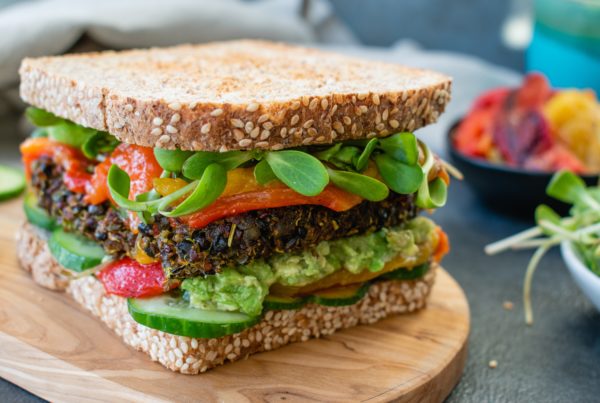Transitioning to a plant-based diet can be very beneficial for not only your health, but also for the environment. Many people adopt a vegan diet for different reasons, and in this day and age, the transition may be less daunting due to the amount of vegan-friendly products and meat substitutes that are available.
The vegan diet is associated with many health benefits because those who are on this diet only eat plant-based foods. Plants are naturally high in fibre, do not contain cholesterol, and are low in saturated fat which may lower the risk of heart disease. However, since veganism eliminates all animal products, being aware of the risk of deficiency in the nutrients that are present in higher amounts in animal foods is quite important! The micronutrients to pay attention to include omega 3 fatty acids, vitamin B12, vitamin D, iron, zinc and iodine which are typically found in foods like meat, seafood, eggs, and dairy.
A vegan diet can definitely provide all of the nutrients that you need, but only with careful planning. Let’s take a look at the nutrients of concern and why they are important in the human body.
Omega 3 Fatty Acids (EPA/DHA)
Omega 3s are important for cardiovascular health, eye and brain function. Omega 3s are called essential fatty acids because they cannot be made by your body therefore they must be consumed. There are 3 main types of omega-3 fatty acids: ALA, EPA and DHA. ALA is found in plant foods such as nuts, seeds, vegetable oils and soy foods while EPA and DHA are found in animal foods like oily fish and seafood.
As a result, vegans essentially consume no dietary EPA or DHA unless they take marine algae supplements. ALA can be converted by the body into EPA and DHA but that rate of conversion is low and can be even lower if your omega-6 intake is high. A general recommendation for vegans is to increase ALA consumption to boost the conversion of ALA into EPA and DHA. This can be done by incorporating ALA rich foods such as ground flaxseeds, walnuts, canola oil and soy.
Vitamins B12
Vitamin B12 plays a major role in maintaining your central nervous system, DNA synthesis, metabolism, and red blood cell formation. Studies have found that vitamin B12 intake among vegans are typically below the EAR and because it is a nutrient only found in animal foods, vegans are at the highest risk for vitamin B12 deficiency. In addition, high folate intake (typical in plant-based diets) can mask the presence of vitamin B12 deficiency which negatively affects red blood cell production and neurological function.
Reviewed by Reviewed by Annie Tsang, RD
References
Palmer S. (2014). Nutrients of concern for individuals following a plant-based diet. Today’s Dietitian. 2-8. https://www.todaysdietitian.com/pdf/courses/PBDNutritentsofConcern.pdf
What you need to know about following a vegan eating plan. What You Need to Know About Following a Vegan Eating Plan – Unlock Food. (n.d.). https://www.unlockfood.ca/en/Articles/Vegetarian-and-Vegan-Diets/What-You-Need-to-Know-About-Following-a-Vegan-Eati.aspx



